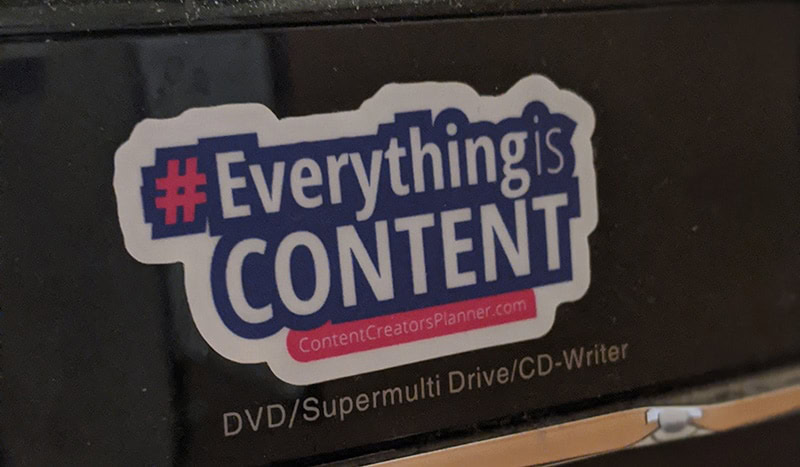I hate the word “Blog”
But under almost any circumstance, I recommend clients to do some sort of “blogging” on their website… I just cringe a little bit when I say it.
Because I know exactly what you’re thinking… “a Blog?”
Our Preconceived Notions About a ‘Blog’
I think the early days of blogging, and it’s meaning, have stuck around with us. We think of it as amateur. We think it’s unprofessional. We think of the punchline that is thrown at the lazy, out-of-work character on every TV sitcom.

We all know that there are no qualifications to be a “blogger”— you don’t have to be certified or even talented— you just say “I’m a blogger” if you publish something on the internet.
You might think of the person who sits around and writes about what they ate that day, or other “diary entries”. And there’s a reason for that… It’s how blogs really got started.
What people didn’t realize when they began blogging about nonsense is the power their fresh and continually updated content would have on the internet.
In today’s marketing terms we think of blogs as “content marketing”— which is arguably the most powerful form of marketing in existence.
If you have a website, should you have a blog? We’re going to figure that out in this article…
But let’s quit thinking about it as a “blog” so we can change our mindset about what we’re producing and understand why it’s useful.
Everything is Content (says Kim Doyal)
Nearly everything we, as users of the internet, consume online is content.
In fact, if you ask my good friend and all-around content queen, Kim Doyal, “Everything is Content”.

YouTube videos, Netflix, social media, quizzes about which Friends character you are— but most importantly when we need to research something (specifically to make a buying decision) we turn to content on the internet.
The content we find has a huge influence over our buying decisions.
If a company’s website doesn’t answer the questions we have about their service or product, we typically don’t call and ask— we move on to the next company, and the next, until we find the answer we’re looking for.
The Benefits of Creating Content
Creating content (aka “blogging”) on your website about your product or service is one of the most valuable things you can do to help market your business. It does a number of things…
It answers your customer’s questions before they ask them. ‘They Ask You Answer’ (a book and philosophy by Marcus Sheridan) takes the approach of simply answering all your customer’s questions through content on your website. If one customer asks you something, there are likely others (hundreds or even thousands of people) with the same question. If you can answer people’s questions before they even ask, they will instantly start to trust you more (it’s called empathy— and it’s really important in marketing).
It shows that you are knowledgeable and an expert in your field. I’ve had people inquire with me about a website project before and comment that they chose to reach out to me over other web developers because of how I explain things on my website. Some even admitted they didn’t bother to actually read any of it, but they saw how much I had written on the topic and assumed I must be an expert.
Improves your rankings in search engines. Even though the original bloggers likely had no idea, publishing updated content to your website regularly is one of the most powerful things you can do to improve your presence and rankings in search engines. Continually producing content shows search engines you are actively engaged in your website and almost naturally all the content you produce is going to add to the keywords and phrases that support your product or service.
Provides you with things to share on social media. Most small businesses will sign up for social media accounts because it’s just kind of what you do— but if you scroll through the majority of them you’ll find that they haven’t posted in months or what they are posting isn’t helpful. Fresh content on your website gives you something to share, and hopefully, something that will help your audience.
Increases the number of people linking to your website. Other websites linking to your website is, generally, a good thing. But someone’s not likely to link to your boring ‘About’ page— they are more likely to link to an interesting article that helped them in some way. Your blog articles can solve problems, answer questions, provide instructions, etc.— all of which makes for information people will want to link to.
It will make you better at your job. We all suffer from something called “the curse of knowledge”. Things that we deal with on a daily basis (our industry) seem like common knowledge to us— but it’s likely completely foreign to your customers. Just the exercise of writing and explaining intricacies about your business will force you to be more articulate and empathetic to your customer’s point of view— science says so.
An Alternative Phrase to “Blogging”
The entire idea of blogging is great, and powerful, and one of the most effective forms of marketing today— but if you’re like me and you have a bad connotation with the word ‘blog’, then you probably aren’t likely to do it.
Just think of the eye-rolls you’ll get when you tell your family “I started a blog!”. I can’t even imagine the words coming out of my mouth (but here I am writing a blog right now!).
So instead of letting the word become an obstacle for you achieving your goals online, let’s simply change the way we talk (and think) about what we’re doing.
You’re not blogging, you are publishing articles.
Woah! Doesn’t that sound much more professional? Don’t you feel a little more proud of yourself?
In essence, it’s the same thing— but this mind-shift has instantly given me more motivation to publish content on my website. I even changed the menu link on the header of my website from “blog” to “education center”. Not only does it sound better, but it’s also actually much more representative of the type of content you’ll find on my “blog”.
When a customer asks me if they need a privacy policy on their website, I can answer their question and finish with “I actually wrote an article about that subject on my website, here’s the link which will go into more detail”.
Look— you haven’t even read the article I wrote on privacy policies yet, but just hearing that I did it I bet you automatically think I know what I’m talking about, don’t you? At least a little?
You Are Powerful — You Are a Publisher
Back in the dinosaur age (as a thirty-something, this just means any time before the internet), you would have to pull some strings to get something “published” and for it to be seen by even just your community in the local paper.
Today, you have the power to publish something that’s instantly accessible to the entire world.
Think about that!
If you have a website, you have that power. You are a publisher.
Not only that, unlike your local newspaper, people are actually reading the internet and searching for answers that you can provide.
If you’re not yet taking advantage of that, you are wasting opportunity. Opportunity to be seen. Opportunity to be trusted. Opportunity to grow your business.
So, Should You Have a Blog?
I’ll let you decide…
Do you want to be a trusted authority in your industry?
Do you want to be found in search engines?
Do you want to answer your customer’s questions before they ask them?
Do you want things to share on your social media account?
If you answered yes to any of these questions, then yes, you should have a blog.
Just, let’s call it something else, okay?




